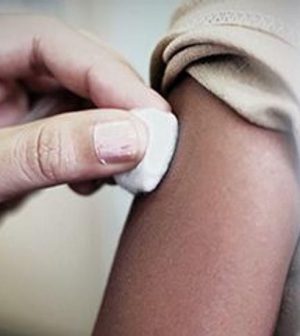- Recognizing the Signs of Hypothyroidism
- 10 Strategies to Overcome Insomnia
- Could Artificial Sweeteners Be Aging the Brain Faster?
- Techniques for Soothing Your Nervous System
- Does the Water in Your House Smell Funny? Here’s Why
- Can a Daily Dose of Apple Cider Vinegar Actually Aid Weight Loss?
- 6 Health Beverages That Can Actually Spike Your Blood Sugar
- Treatment Options for Social Anxiety Disorder
- Understanding the Connection Between Anxiety and Depression
- How Daily Prunes Can Influence Cholesterol and Inflammation
COVID Antibodies From Vaccination Are Almost 3 Times Higher Than From Infection

People who’ve been fully vaccinated against COVID-19 have a much stronger immune system response against the new coronavirus than those who’ve previously been infected, according to a new study.
“Vaccinated individuals had the highest antibody levels, nearly three times higher than that of convalescent individuals recovering from symptomatic COVID-19,” an Israeli team reported.
What’s more, while 99.4% of vaccinated people tested positive for COVID-fighting antibodies in blood samples just six days after their second dose of vaccine, the number of these “seropositive” people fell to just under 76% for people recovering from a COVID-19 infection.
These findings might encourage people who believe they’re already well-protected because of a prior encounter with SARS-CoV-2 to go ahead and get vaccinated, one expert said.
“This is an encouraging study that further confirms that vaccination against COVID-19 provides a stronger immune response than recovering from infection,” said COVID-19 expert Dr. Eric Cioe-Peña, who directs Global Health at Northwell Health, in New Hyde Park, N.Y. He wasn’t involved in the new research.
The study also found that men and women have different antibody levels after either vaccination or infection.
“It’s well-known that there are differences in immune response that vary with sex,” noted virologist Dr. Amesh Adalja, who wasn’t involved in the research.
“This is likely the result of differential proportions of hormones like estrogen and testosterone,” said Adalja, a senior scholar at the Johns Hopkins Center for Health Security, in Baltimore.
The new research was led by Noam Shomron, head of the Computational Genomics Laboratory at Tel Aviv University, and Dr. Adina Bar Chaim, from the Shamir Medical Center in Tel Aviv. Their team assessed COVID-19 antibody levels in more than 26,000 blood samples from vaccinated and unvaccinated people, along with people who’d recovered from their COVID-19 infections.
The researchers also found age-related differences between convalescent or vaccinated men and women.
Among those older than 51, antibody levels were found to be higher in women than in men. This may be related to the change in levels of the female hormone estrogen, which occur around this age and affect the immune system, the study authors said.
In men, a rise in antibody levels was seen starting around 35, possibly associated with changes in levels of the male sex hormone testosterone and its effect on the immune system.
Overall, young adults had a higher level of antibodies that lasted longer compared to older vaccinated adults, the study found, and a decrease at a level of tens of percent occurred over time between younger and very old adults.
In young adults, a high concentration of antibodies is usually due to a strong immune response, while in older people it usually indicates overreaction of the immune system associated with severe illness, the researchers explained.
“Further research is required in order to obtain an in-depth understanding of the immune system’s response to COVID-19, to recovery from the disease, and to the vaccine,” the two lead authors wrote jointly in a Tel Aviv University news release.
The study was published on medRxiv, a “pre-print” server for health research, so it’s important to note that the data have not yet been peer-reviewed.
More information
The U.S. Centers for Disease Control and Prevention has more on COVID-19 vaccines.
SOURCES: Eric Cioe-Peña, MD, director of global health, Northwell Health, New Hyde Park, N.Y.; Amesh A. Adalja, MD, senior scholar, Johns Hopkins Center for Health Security, Baltimore; medRxiv, July 8, 2021, online; Tel Aviv University, news release, July 13, 2021
Source: HealthDay
Copyright © 2026 HealthDay. All rights reserved.










